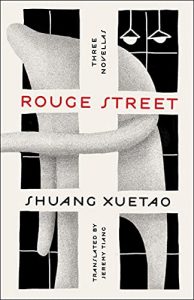Ian Mond Reviews Rouge Street: Three Novellas by Shuang Xuetao
 Rouge Street: Three Novellas, Shuang Xuetao (Metropolitan Books 978-1-25083-587-1, $26.99, 240pp, hc) April 2022.
Rouge Street: Three Novellas, Shuang Xuetao (Metropolitan Books 978-1-25083-587-1, $26.99, 240pp, hc) April 2022.
Rouge Street: Three Novellas is the first English-language publication of Shuang Xuetao’s fiction, translated by Jeremy Tiang, who worked on Yan Ge’s Strange Beasts of China last year. Like Yan Ge, Xuetao’s short stories and novels have long been celebrated in China. He’s taken home several awards, including the Blossoms Literary Prize, the Wang Zengqi Short Story Prize, and the Blancpain-Imaginist Literary Prize for best Chinese writer under fourty-five, and, according to the book’s back cover blurb, has been compared to Ernest Hemingway and Haruki Murakami. Whether this comparison is accurate is for others to judge: what I can say is that the three novellas collected in Rouge Street, centred on the lived experience of China’s working class, eking out a living in the remnants of the country’s industrial revolution, provide an eclectic mix of family drama, crime fiction, and a dollop of the fantastic.
As Jeremy Tiang explains in his translator’s note, the “rouge” in Rouge Street is an English approximation of “Yanfen,” which translates literally as “bright powder.” Located in China’s North-East in the provincial city of Shenyang, Yanfen Street was where Xuetao spent his formative years in the ’90s, a point in time when China was going through a seismic paradigm shift. Despite a growing economy, the State-owned industry, much of it located in the North-East, was not making a profit. This led the Communist Government in 1997 to approve the private ownership of these loss-making businesses. It’s a move that arguably transformed China into the economic powerhouse it is today, but in places like Shenyang – and Yanfen Street, where many of the workers and their families lived – it resulted in a sizeable reduction in the workforce. As a teenager, Xuetao experienced this change first-hand, and the profound effect it had on him and his family can be deeply felt in the three novellas.
The opening novella, “The Aeronaut”, is not directly set on Yanfen Street but instead in the surrounding district. The title refers to Li Minqi, a dreamer, an inventor, and possibly a grifter, born with “light bones” who aspires to build a flying device. “Something you can put on like clothes…” he explains to his future father-in-law Gao Likuan. “Say you want to visit my family – just slip it on, glide above the street, and land in our courtyard.” Gao, who initially bristles at the boy and his bell bottoms, is taken by Li Minqi’s vision and becomes the first of many to loan money to the young man, money that is never paid back. The narrative, which switches between the late 1970s and the present day, where Gao Likuan’s grandson is sent by his Aunt to search for his missing Uncle (Li Minqi) and cousin, is a story that touches on issues of mental health, self-harm, and unfulfilled ambitions, but also has a whimsical, magic-realist quality – with the most beautiful ending – that ensures the story is never anchored in misery or despair.
The astonishing “Bright Hall” is set on Yanfen Street, but a version where the topography has been tweaked. When Zhang Mo’s father secures a job in Xinmin with room and board, he is sent to stay with his Aunty, Zhang Yafeng, and young cousin Gooseberry on Yanfen Street. Mother and daughter live in Bright Hall, the old Worker’s Home, where Yafeng gives dancing lessons, while once a week the travelling Pastor Lin fills the hall with congregants. But when the Pastor is murdered on the street outside Bright Hall, both Zhang Mo and Gooseberry find themselves tracking down the killer during a blizzard, a chase that leads them to the frozen and treacherous Shadow Lake. I loved the prickly but tender friendship between Zhang Mo and Gooseberry, but it’s the story’s shift to the fantastic – which I wouldn’t dare spoil – that I found so jaw-droppingly brilliant and unexpected.
As Madeleine Thien informs us in her excellent and insightful foreword, the final novella, “Moses on the Plain”, was “a sensation, catapulting [Xuetao] into a literary stardom.” (The film adaptation, Fires on the Plain, was one of the first movies to wrap production since the start of the pandemic). It’s a crime story, split across multiple viewpoints, that follows the investigation into the murder of several taxi drivers. The officer tasked to solve these serial murders is Zhuang Shu. Brought up in a privileged family, he never showed much interest in his father’s business acumen or his mother’s love for art and literature. In contrast, Shu’s childhood friend and neighbour, Li Fei, displays a keen intelligence and is taken under the wing of Shu’s mother, that is until Li’s father is made redundant and they are forced to relocate. As Shu digs deeper into the deaths of the taxi drivers, the investigation leads him inexorably back to Li Fei. Of all the novellas, this is the most structurally ambitious, seamlessly shifting both in time and between the contrasting perspectives of Zhuang Shu, Li Fei, and their parents. It’s the story that best shows the growing divide that emerged in China after 1997, with Shu’s family enjoying increased wealth while Lei and her father are forced into poverty. As a detective story, it’s wonderfully dark and gritty, with a couple of unexpected turns and an ending that deftly ties together both the theme and the plot.
Rouge Street: Three Novellas is just a drop in the ocean of Xuetao’s output. I can only hope that we see more of his work translated in the coming years.
Ian Mond loves to talk about books. For eight years he co-hosted a book podcast, The Writer and the Critic, with Kirstyn McDermott. Recently he has revived his blog, The Hysterical Hamster, and is again posting mostly vulgar reviews on an eclectic range of literary and genre novels. You can also follow Ian on Twitter (@Mondyboy) or contact him at mondyboy74@gmail.com.
This review and more like it in the June 2022 issue of Locus.
 While you are here, please take a moment to support Locus with a one-time or recurring donation. We rely on reader donations to keep the magazine and site going, and would like to keep the site paywall free, but WE NEED YOUR FINANCIAL SUPPORT to continue quality coverage of the science fiction and fantasy field.
While you are here, please take a moment to support Locus with a one-time or recurring donation. We rely on reader donations to keep the magazine and site going, and would like to keep the site paywall free, but WE NEED YOUR FINANCIAL SUPPORT to continue quality coverage of the science fiction and fantasy field.
©Locus Magazine. Copyrighted material may not be republished without permission of LSFF.




